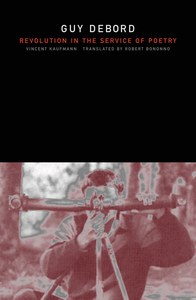“The Society of the Spectacle is beyond criticism. It is a book in which everything that needs to be said has been said. It is the book, or the book. Debord’s version of the old dream of the total book that would contain the world, a book encompassing the world.” So says Vincent Kaufman on page 256 of his almost obsessively thorough study of Guy Debord. The other 274 pages, plus 70 more of notes, bibliography and index provide as fine an analysis as anyone interested in this French Marxist, theorist, “Lettrist” and “Situationist” (December 28, 1931 – November 30, 1994) would hope for. Dealing as it does not only with the book (and accompanying film) from which his fame was made, but also such lesser known but equally compelling works as Howls For Sade, In Girum Imus Nocte Et Consumimur Igni, Memoires, Contre le cinéma, and Considérations sur l’assassinat de Gérard Lebovici.
The last-mentioned deals of course with his patron, publisher and film impresario whose mysterious murder in 1984 (the motive and perpetrators of which have never been identified) cast a pall over the final years of a deeply serious and thoughtful intellectual whose disinclination to (as we say today) “brand himself” as a cultural personality is as one with his refusal to participate in a society that provides “at once a faithful mirror held up to the production of things and a distorting objectification of the producers.”
Born in Paris Debord was raised by his grandmother in a series of Mediterranean towns – his father having died when he was quite young, his mother well out of the picture. Having dropped out of University of Paris where he was studying law Debord founded the “Letterist International”. This was all in the immediate post World War II period in which Debord became part of what Kaufman rhapsodizes over as “the lost children of Saint-Germain-des-Prés.” Debord then moved on to help found the “Situationist International” (also briefly becoming a member of “Socialisme ou Barbarie”) and (much like Philippe Garrel became actively involved in the uprisings of May ’68. Published just the year before, The Society of the Spectacle was seen by many as catalyzing the uprising.
It also parallels a critique of modern society that Jean-Luc Godard instituted at the same time with his 2 ou 3 choses que je sais d’elle (France 1967) and continued on and off with such works as Le Gai Savoir (France/West Germany 1969), France/Tour/Detour/Deux Enfants (France 1977-1978) and Histoire(s) du cinema (France 1997). But while Godard spun off into the Maoism he parodied in La Chinoise (France 1967) only to lose his footing with the zeitgeist he once seemingly owned. By contrast Peter Watkins, most especially in his epic La Commune, Paris 1871 (France 2000), is the only figure who can be said to have taken on the culture with Debord’s thoroughness.
Debord took a different path to either of these cinematic giants. Partially because of his disinterest in becoming a “star” in and of himself but also due to a sense of caution that set in, partially because of Lebovici’s death but also doubtless due to the disillusion that set in post May 68 (reflected most sharply in Jacques Rivette’s Out 1 [France 1971] and Garrel’s Les Amants Reguliers [France 2005] ) with the realization that the battle cry “l’imagination au pouvoir” had evaporated into nothing, and the world that supposedly changed became more rigid and ideologically controlling than before.
An alcoholic, Debord suffered from a form of polyneuritis so severe that it moved him to suicide – shooting himself in the heart. This sad end did nothing to sully his reputation. In 2009 his works were declared “A National Treasure” by the French Ministry of Culture – an accolade one knows would have unnerved Debord. But, as Kaufman shows, nothing can be done to undermine the power of his critique of the status quo. And his voice remains as vibrant today as when it was first heard so many decades ago. As for Kaufman’s book, it goes without saying that it’s required reading.

